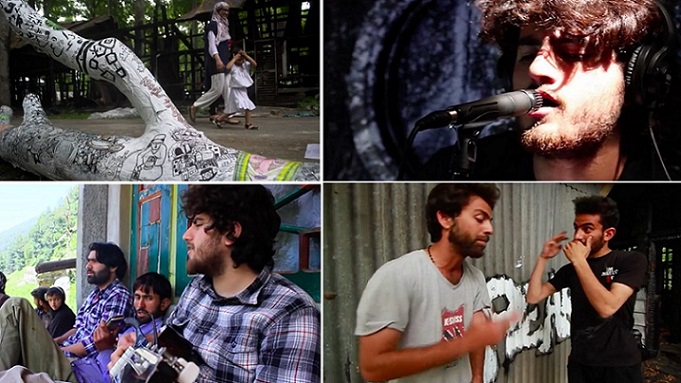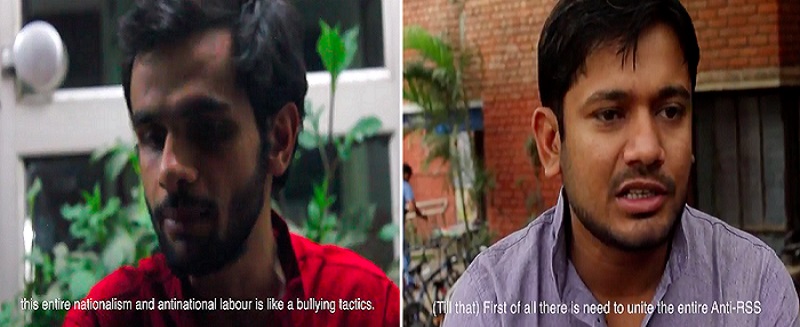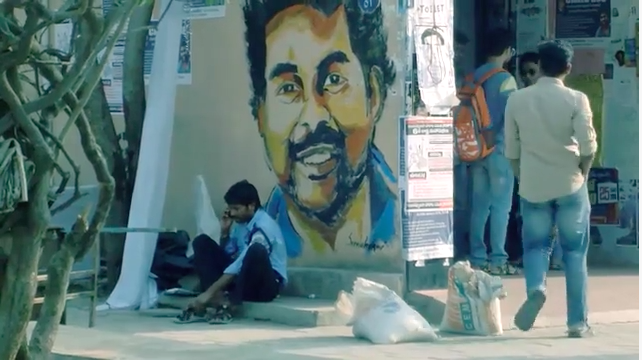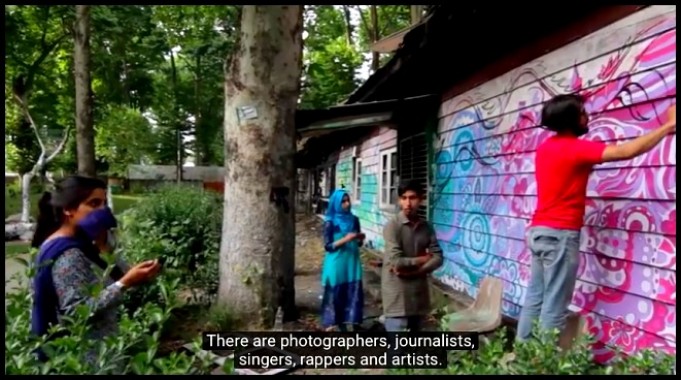Visual tales born out of conflict
A scene from "In the Shade of a Fallen Chinar."
Out of Kashmir comes a refreshingly different film—a here and now documentary of a Kashmir we no longer ever see through a non-fiction camera lens. The landscape is beautiful, and fresh young faces speak matter-of-factly of how they have turned to art to find a response to conflict. “In the Shade of a Fallen Chinar” captures the painters, rappers, guitarists, and writers who paint on the bark of a fallen chinar, on walls in their village, bring out a campus journal, and just meet in groups to talk with others like themselves of creative ways to give expression to their angst. “Conflict is the perfect place for art to thrive”, says the young man who is the narrator.

Scenes from the film
What you don’t find here is any reference to stone pelters or rape, no footage of conflict or violence. Conflict is the backdrop, the raison d’etre for emergence of the art and music being talked about. If this is a film that the mighty government of India could not deal with, and had to deny an exemption of censorship to for showing at the recent Kerala festival of short films, it is really quite sad. Of the three films denied such exemption, this one doesn’t even mention the BJP or RSS.
The narrator says he is a rock and roll fanatic. They are now into escapism he says. Not from the conflict, but from the harshness that has seeped into them because of it. The film was shot a month before the Burhan Wani killing in July last year. It ends with the gentle assertion that this is a film with a peaceful ending.

Scenes from "March March March"
In “March, March, March,” the film about protests at JNU, the JNU leaders speaking in the film are not saying anything that they have not been heard saying on TV before. Yes the ruling coalition and the RSS come in for angry comment. Yes Arundhati Roy’s address to the students is also captured here, but surely documentaries in India have captured far more than this in the past and have been found fit to show at festivals? Without the glory tag of having been denied censorship exemption it would just be another film about student protests on a campus at a point of simmering tension, against the backdrop of a wider resistance building up.

The protest venue at Shopcom
Then we come to the Rohit Vemula film called The Unbearable Being of Lightness.” Not very well made but telling the really moving tale of this young man. It tells you much more about his personal tragedy than the unfairness inflicted upon him by the university system. For much of the film there is a random capturing of the protests that found their nucleus at Shopcom, the Central University of Hyderabad hangout where students gravitate. There is one passing reference to the ABVP and one to the RSS, so that doesn’t seem to be what made it unacceptable to the ministry. What then?

If the film is powerful it is because of the protagonist’s artless telling of his own conflicted existence, in his suicide note. Not because it is a stylistically hard hitting documentary. What you remember is not the protest that his death spawned, but the story of a Dalit lad and his brother growing up and desperately seeking opportunity. Is it the government’s case that the societal injustice this country inflicts is to be kept under wraps? For God’s sake.







